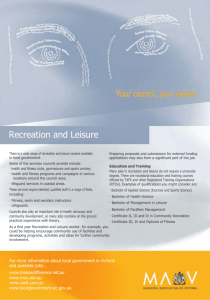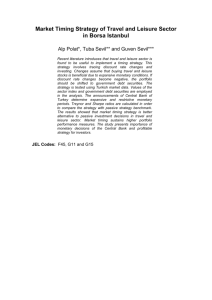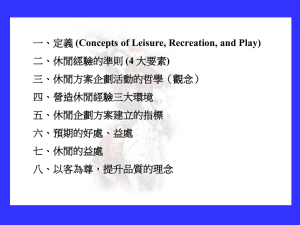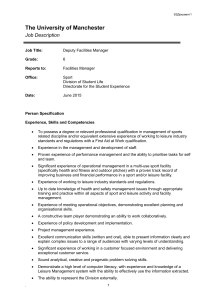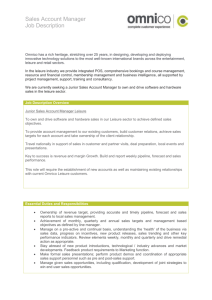REC 469 Intervention in TR - Pittsburg State University
advertisement
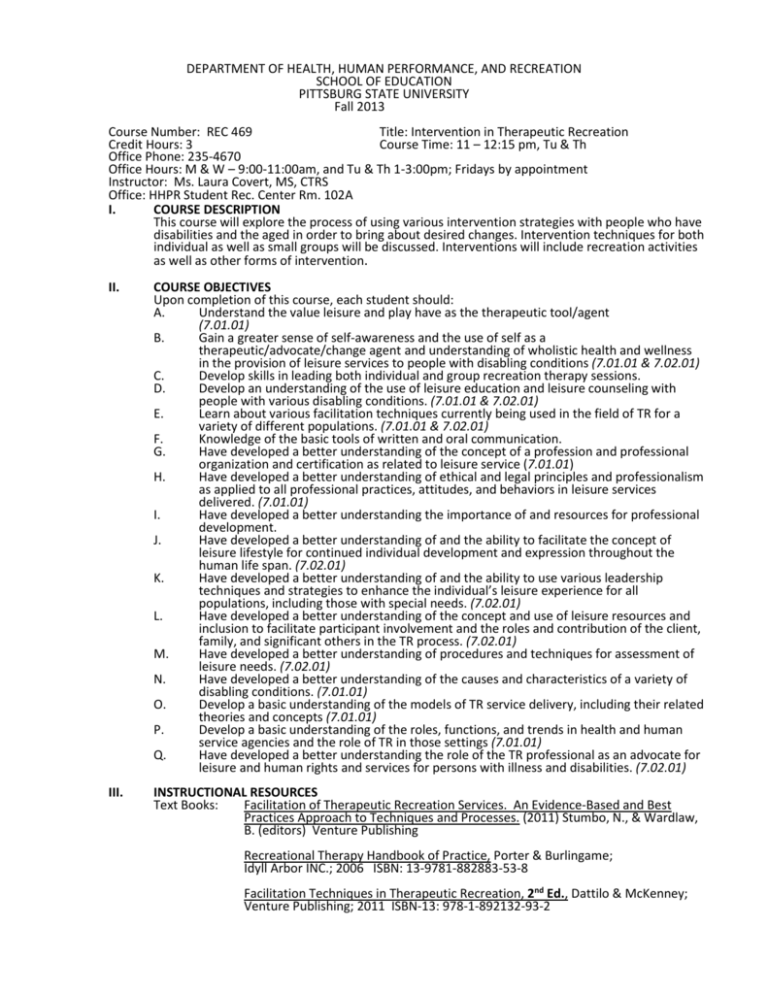
DEPARTMENT OF HEALTH, HUMAN PERFORMANCE, AND RECREATION SCHOOL OF EDUCATION PITTSBURG STATE UNIVERSITY Fall 2013 Course Number: REC 469 Title: Intervention in Therapeutic Recreation Credit Hours: 3 Course Time: 11 – 12:15 pm, Tu & Th Office Phone: 235-4670 Office Hours: M & W – 9:00-11:00am, and Tu & Th 1-3:00pm; Fridays by appointment Instructor: Ms. Laura Covert, MS, CTRS Office: HHPR Student Rec. Center Rm. 102A I. COURSE DESCRIPTION This course will explore the process of using various intervention strategies with people who have disabilities and the aged in order to bring about desired changes. Intervention techniques for both individual as well as small groups will be discussed. Interventions will include recreation activities as well as other forms of intervention. II. COURSE OBJECTIVES Upon completion of this course, each student should: A. Understand the value leisure and play have as the therapeutic tool/agent (7.01.01) B. Gain a greater sense of self-awareness and the use of self as a therapeutic/advocate/change agent and understanding of wholistic health and wellness in the provision of leisure services to people with disabling conditions (7.01.01 & 7.02.01) C. Develop skills in leading both individual and group recreation therapy sessions. D. Develop an understanding of the use of leisure education and leisure counseling with people with various disabling conditions. (7.01.01 & 7.02.01) E. Learn about various facilitation techniques currently being used in the field of TR for a variety of different populations. (7.01.01 & 7.02.01) F. Knowledge of the basic tools of written and oral communication. G. Have developed a better understanding of the concept of a profession and professional organization and certification as related to leisure service (7.01.01) H. Have developed a better understanding of ethical and legal principles and professionalism as applied to all professional practices, attitudes, and behaviors in leisure services delivered. (7.01.01) I. Have developed a better understanding the importance of and resources for professional development. J. Have developed a better understanding of and the ability to facilitate the concept of leisure lifestyle for continued individual development and expression throughout the human life span. (7.02.01) K. Have developed a better understanding of and the ability to use various leadership techniques and strategies to enhance the individual’s leisure experience for all populations, including those with special needs. (7.02.01) L. Have developed a better understanding of the concept and use of leisure resources and inclusion to facilitate participant involvement and the roles and contribution of the client, family, and significant others in the TR process. (7.02.01) M. Have developed a better understanding of procedures and techniques for assessment of leisure needs. (7.02.01) N. Have developed a better understanding of the causes and characteristics of a variety of disabling conditions. (7.01.01) O. Develop a basic understanding of the models of TR service delivery, including their related theories and concepts (7.01.01) P. Develop a basic understanding of the roles, functions, and trends in health and human service agencies and the role of TR in those settings (7.01.01) Q. Have developed a better understanding the role of the TR professional as an advocate for leisure and human rights and services for persons with illness and disabilities. (7.02.01) III. INSTRUCTIONAL RESOURCES Text Books: Facilitation of Therapeutic Recreation Services. An Evidence-Based and Best Practices Approach to Techniques and Processes. (2011) Stumbo, N., & Wardlaw, B. (editors) Venture Publishing Recreational Therapy Handbook of Practice, Porter & Burlingame; Idyll Arbor INC.; 2006 ISBN: 13-9781-882883-53-8 Facilitation Techniques in Therapeutic Recreation, 2nd Ed., Dattilo & McKenney; Venture Publishing; 2011 ISBN-13: 978-1-892132-93-2 Assistive Devices, Adaptive Strategies, and Recreational Activities For Students with Disabilities, Williams, Buzz; Sagamore Publishers Client Outcomes in Therapeutic Recreation Services; Stumbo, N. (editor); Venture Publishing Therapeutic Recreation Program Design: Principles and Procedures, Peterson and Gunn, 2009 Notes, Video Presentations, and Handouts IV. TEACHING STRATEGIES Lectures Guest Speakers/Videos/Film Discussion Role Playing V. A. Student Presentations Demonstrations EVALUATION Tests: There will be at least two (2) exams during the semester. NOTE: There may be “pop quizzes” that will be used as extra credit – no make-up allowed for these. B. LEISURE EDUCATION PRESENTATION AND IMPLEMENTATION: Each Student, will prepare a presentation of at least one Leisure Education Activity (from one of the three Stumbo Manuals available @ the IRC in Hughes Hall) and facilitate the chosen Leisure Education activity during class this semester. 50 points. Due date to teach the LE Activity TBA. (7.02.01) C. ACTIVITY PAPERS AND ANALYSES ASSIGNMENT: Prepare a minimum of 3 activity writeups (1 for each category using the activities listed), including an Activity Analysis (also on CANVAS) for each one. Due dates will be announced in class. D. The student will research and prepare two (2) selected facilitation techniques and create a Lesson Plan for teaching the techniques to others, 1 for a person with a physical disability and 1 for a person with a cognitive or mental health-related disability. A lesson plan example will be provided. A task and activity analysis are required for each technique. 50 points each. Due dates will be announced in class. (7.02.01) E. ACTIVITY/FACILITATION TECHNIQUE TEACHING: This assignment will be your final. Choose one of the activities from Item “D” above and teach it to the class as if you are a CTRS leading an actual therapy group. Refer to the rubric on Canvas for specific grading criteria. 100 points. This will be due the day of the final; A MINIMUM OF ½ HOUR OF CLASS TIME MUST BE USED IN TEACHING THE ACTIVITY. (7.02.01) F. Prepare a typed minimum two (2) page report on the causes and characteristics of THREE conditions listed below. Then describe one intervention technique for the condition. Goals, objectives, and predicted outcomes need to be included. The three chosen cannot be any you have already written about in this class (for projects, etc.). DUE DATES WILL BE POSTED ON CANVAS. (7.01.01)d 1. Mental Retardation 2. Autism & Cerebral Palsy 3. Learning Disabilities 4. Emotional Disturbances, Behavior Disorders, and Eating Disorders 5. Hearing Impairments 6. Visual Impairments 7. Physically Disabling Conditions: heart condition, T.B.I., Asthma, Amputations, Spinal Cord Injury, Orthopedic conditions, Diabetes, ALS, Epilepsy, MS, MD, Spina Bifida 8. Aging in general, and associated conditions: Alzheimer’s Disease, Parkinson’s, Huntington’s, Multi-infarct, Stroke 9. HIV/AIDS 10. Addictions G. Students are to volunteer with the Bike for Life program with John Lair. Details will be discussed in class. H. Students are to plan, prepare, and facilitate a TR activity for individuals with autism spectrum disorders at Pittsburg Middle School. An activity analysis, goals, objectives, and outcomes must be included in the project. Further details will be discussed in class. Refer to the rubric posted on Canvas for specific grading criteria. (7.02.01) I. Students are to plan, prepare, and execute a TR activity for residents at the Comfort Care Dementia Care home. Students will be divided into two groups for this project. The program will be held the later portion of April during class time. Students’ failure to be present for ANY STEPS IN THE PROCESS will be lowered a letter grade. 100 points. An activity analysis, goals, objectives, and outcomes must be included in the project. (7.02.01) J. Homework: All homework is due on the assigned day and time of class and will not be accepted late for any reason without prior approval. K. Final Grades: Student final grades will be earned based upon the total points possible areas follows Exam I & II (25 points each) 50 Final Exam (tentative) 100 Leisure Education Presentation 50 Activity Analysis 50 Facilitation Presentation (2) 200 Activity Presentation 100 Disabling Conditions 75 Volunteer Hours 50 Comfort Care Project 100 There will be NO extra credit assignments available. ANY ASSIGNMENTS HANDED IN LATE WILL RECEIVE 5 POINTS OFF PER DAY UNTIL RECEIVED. Grades will be earned as follows: A= 90-100% B= 89-80% C= 79-70% D=69-60% F= Below 59% Syllabus supplement and academic dishonesty policy can be found at: http://www.pittstate.edu/dotAsset/9e421c72-1f34-441c-8c7f-2f68fd510e80.pdf TENTATIVE OUTLINE: DUE DATES AND TOPICS ARE SUBJECT TO CHANGE Week 8/19 8/26 9/2 TOPIC Intro of course/syllabus/chapter 1 Leisure Ability Model Labor Day Monday/ Leisure Ability Model/Chapt. 3 (Stumbo) 9/9 Chapt 3. Stumbo: Selecting programs & activities based on goals & outcomes (cont.) OTHER ITEMS DUE (7.02.01) 9/16 10/14 Task Analysis & Activity analysis & Goals & Outcomes (7.02.01) Exam 1; Chapt. 4: Planning and Leading Groups (Stumbo) (7.02.01) Chapt. 4 cont. & Leisure Education (7.02.01) Leisure Education (chapt. 2 Stumbo) Fall Break: No Class Thursday Leisure Education cont. 10/21 Intervention Tech. (Datillo) 10/28 Intervention Tech. (Datillo) (7.02.01) 11/4 Intervention Tech. (Datillo) 11/11 Intervention Tech. (Datillo) 11/18 Intervention Tech. (Datillo) 11/25 12/2 Exam 2 Tuesday Thanksgiving Break: no class Thursday Volunteer Hours Due Thursday 12/9 Finals Week 9/23 9/30 10/7 Exam 1 Tuesday Thursday: Leisure Education Presentations Comfort Care visit: Thursday Comfort Care Activity: Thursday (7.02.01) Tuesday: Conditions papers Pitt Middle School Visit Thursday Pitt Middle School Activity: Thursday (7.02.01) Exam 2 Tuesday Thursday: Two facilitation lesson plans Final will be Tuesday at 11 am


